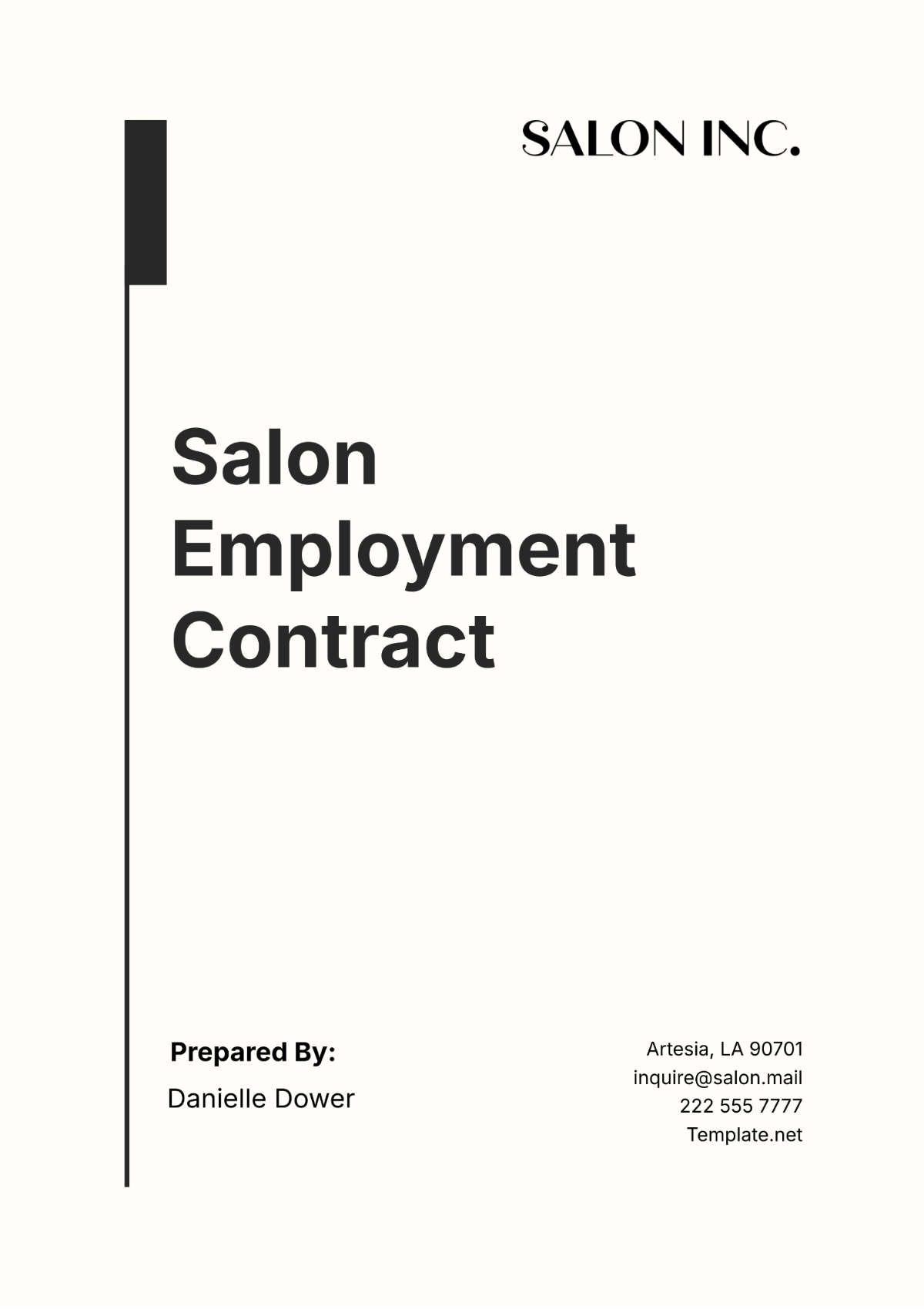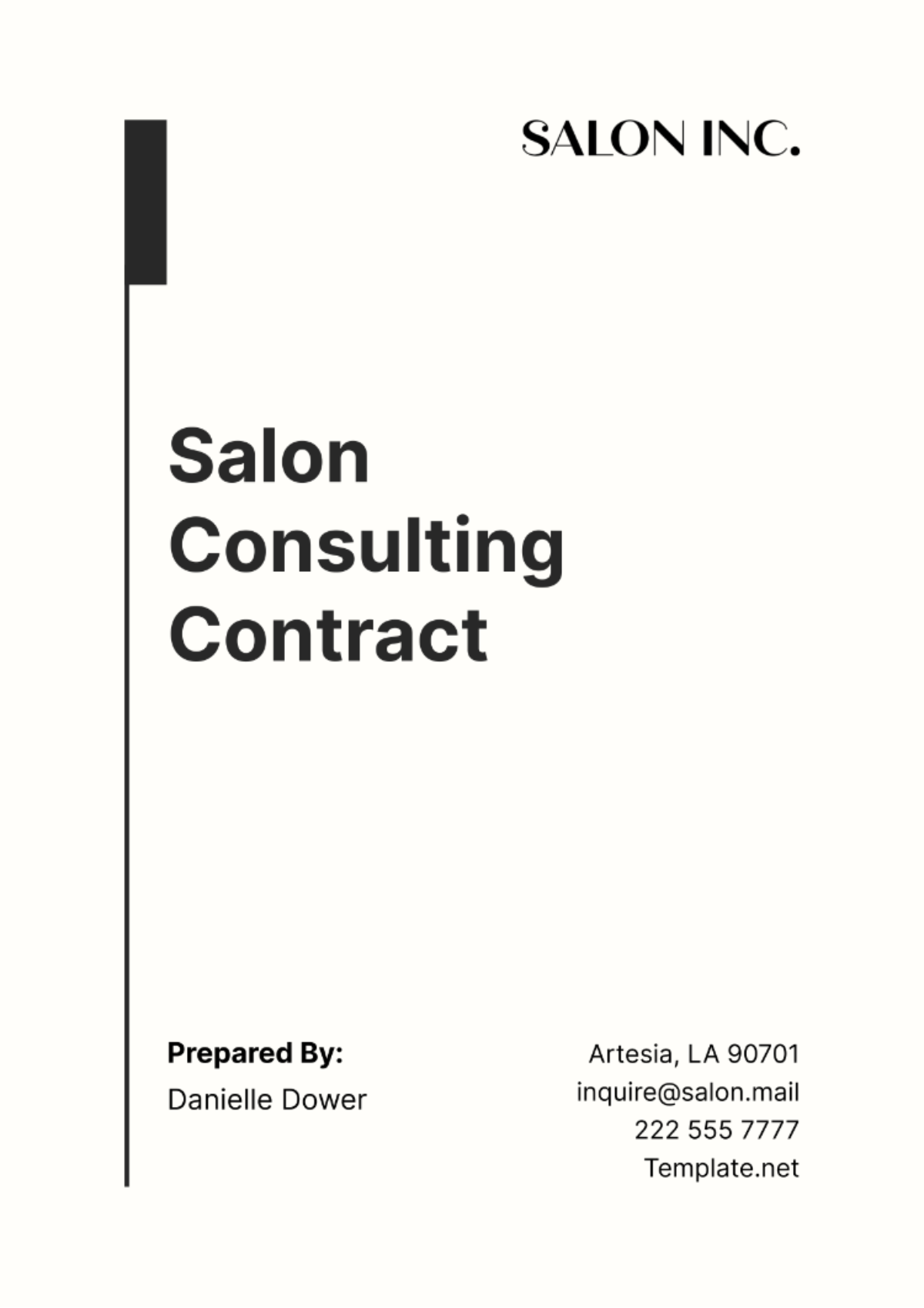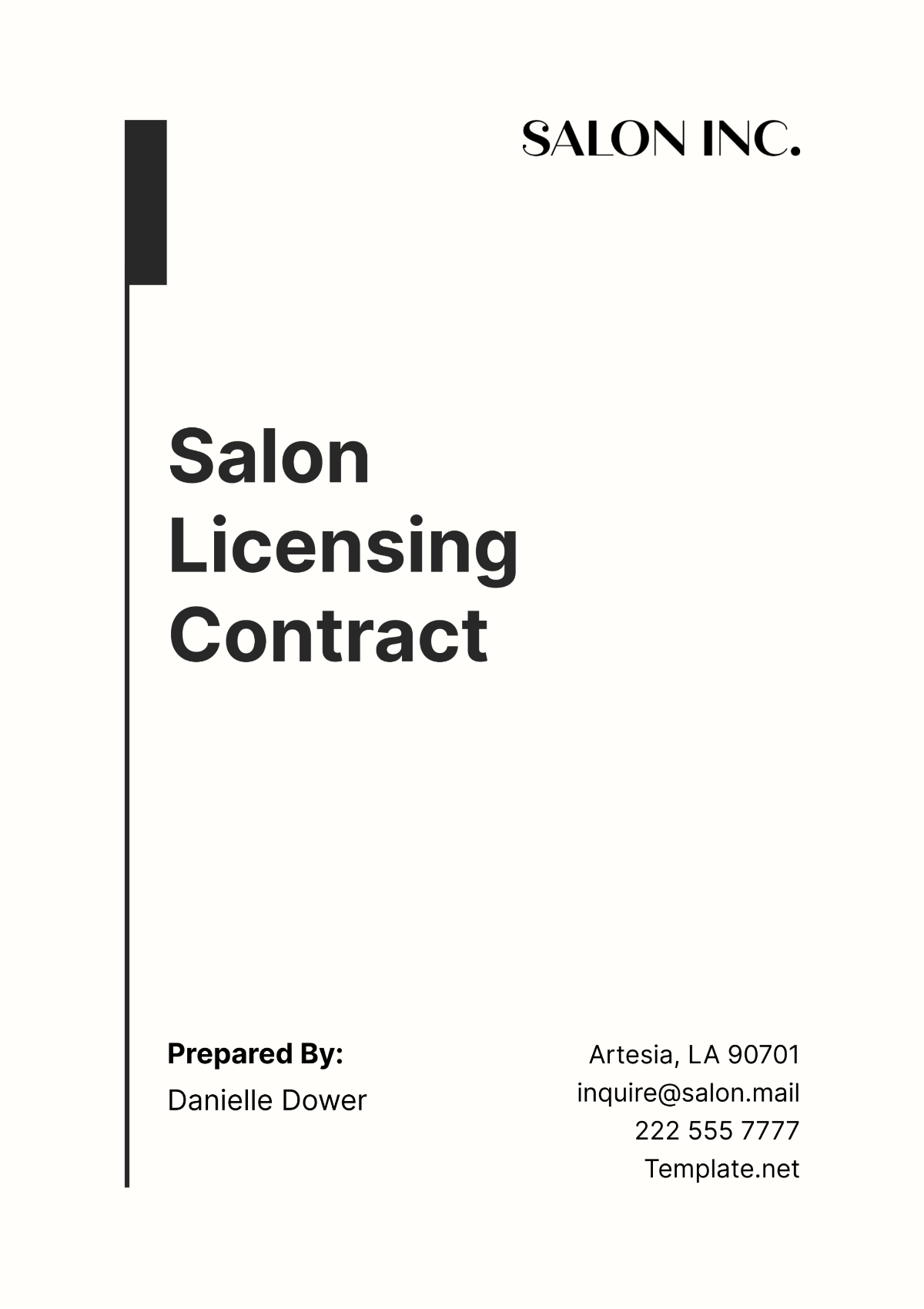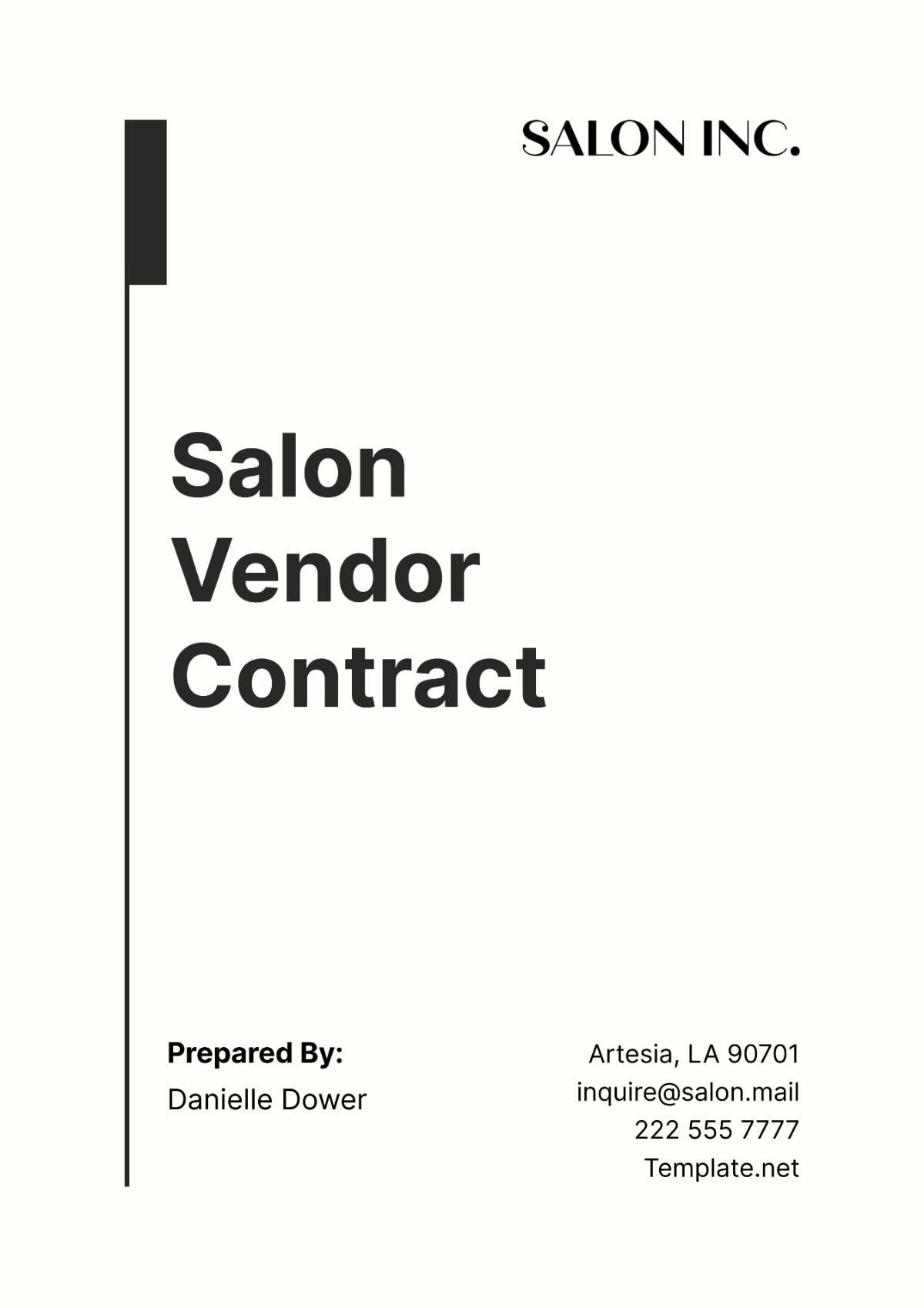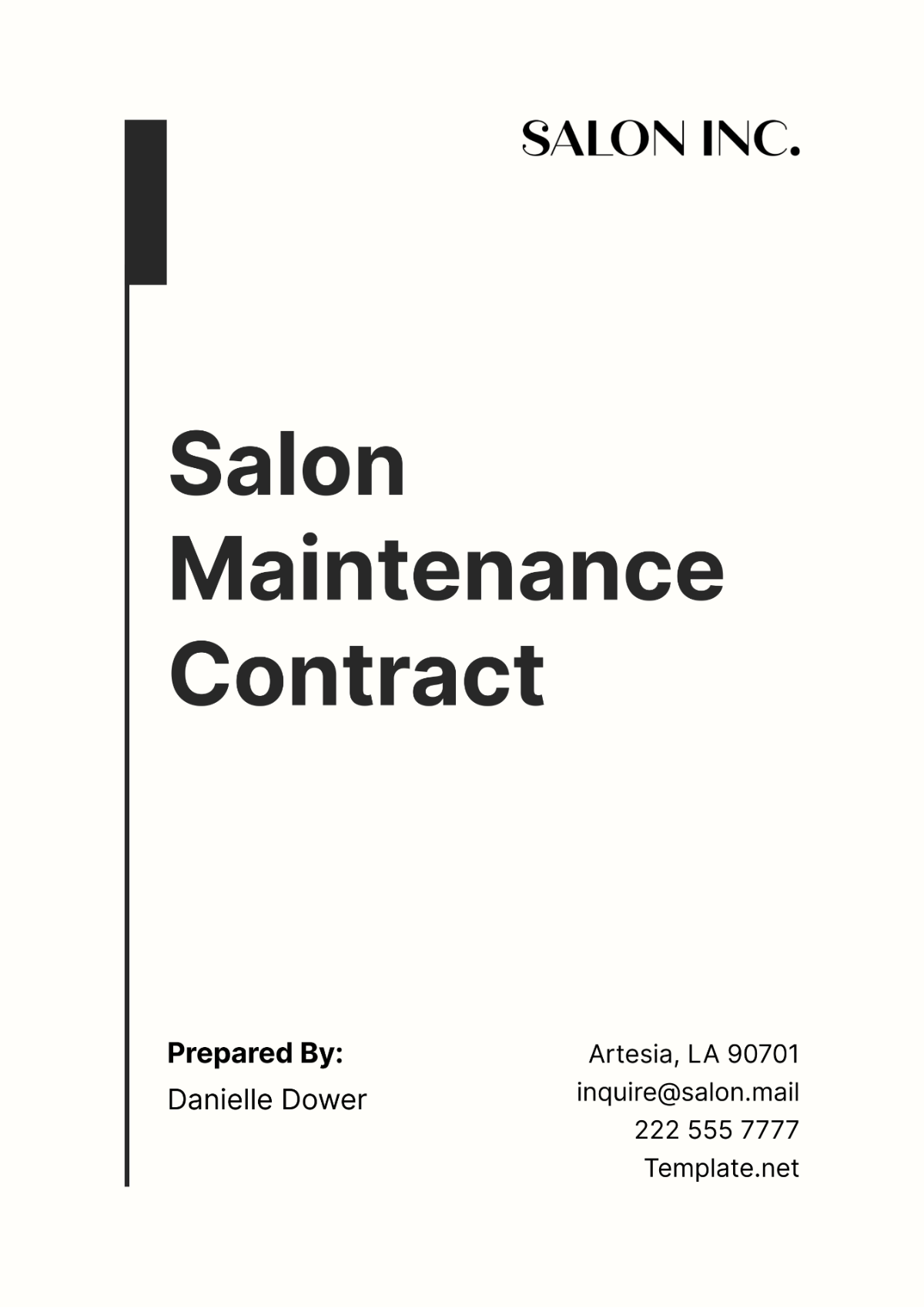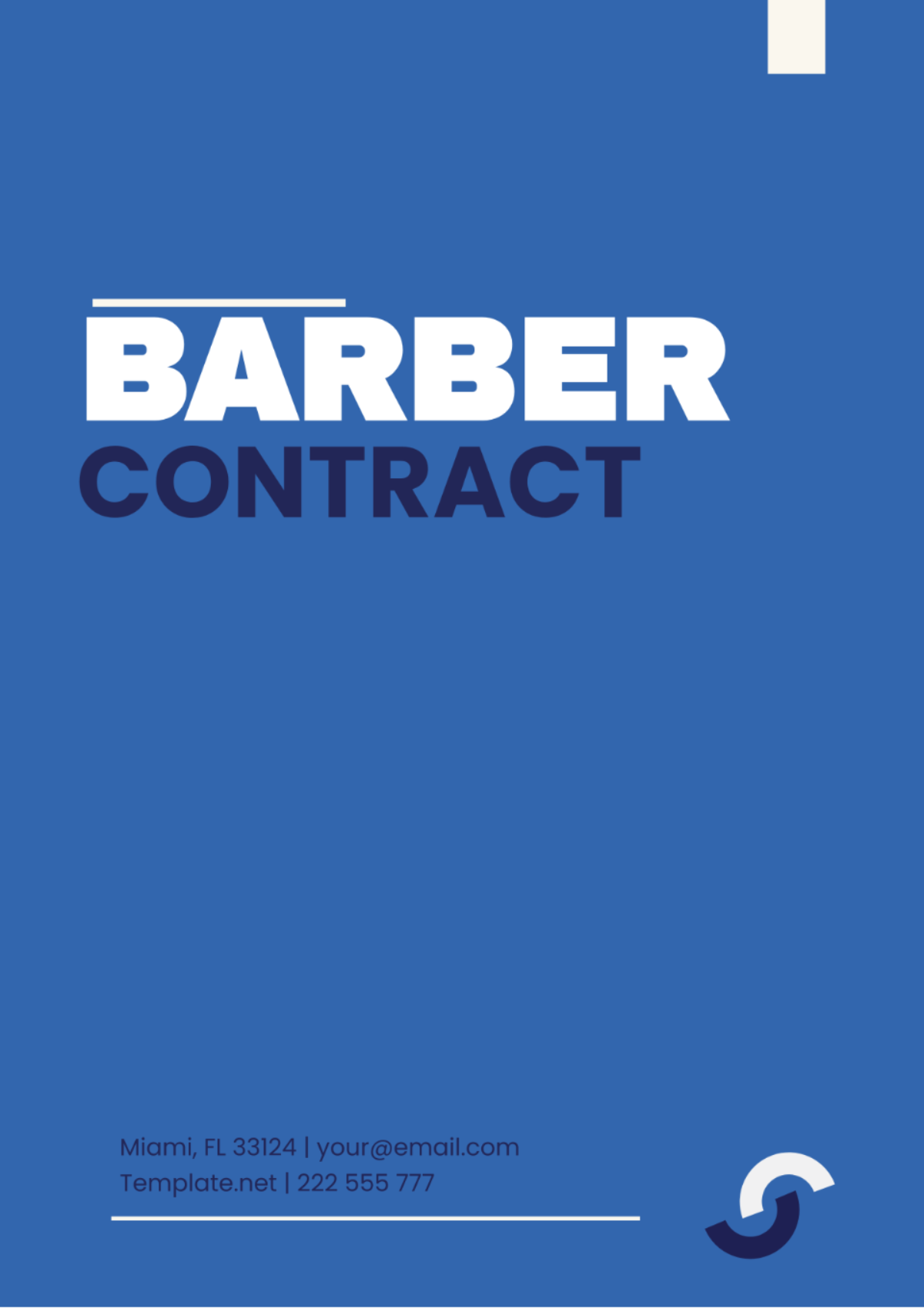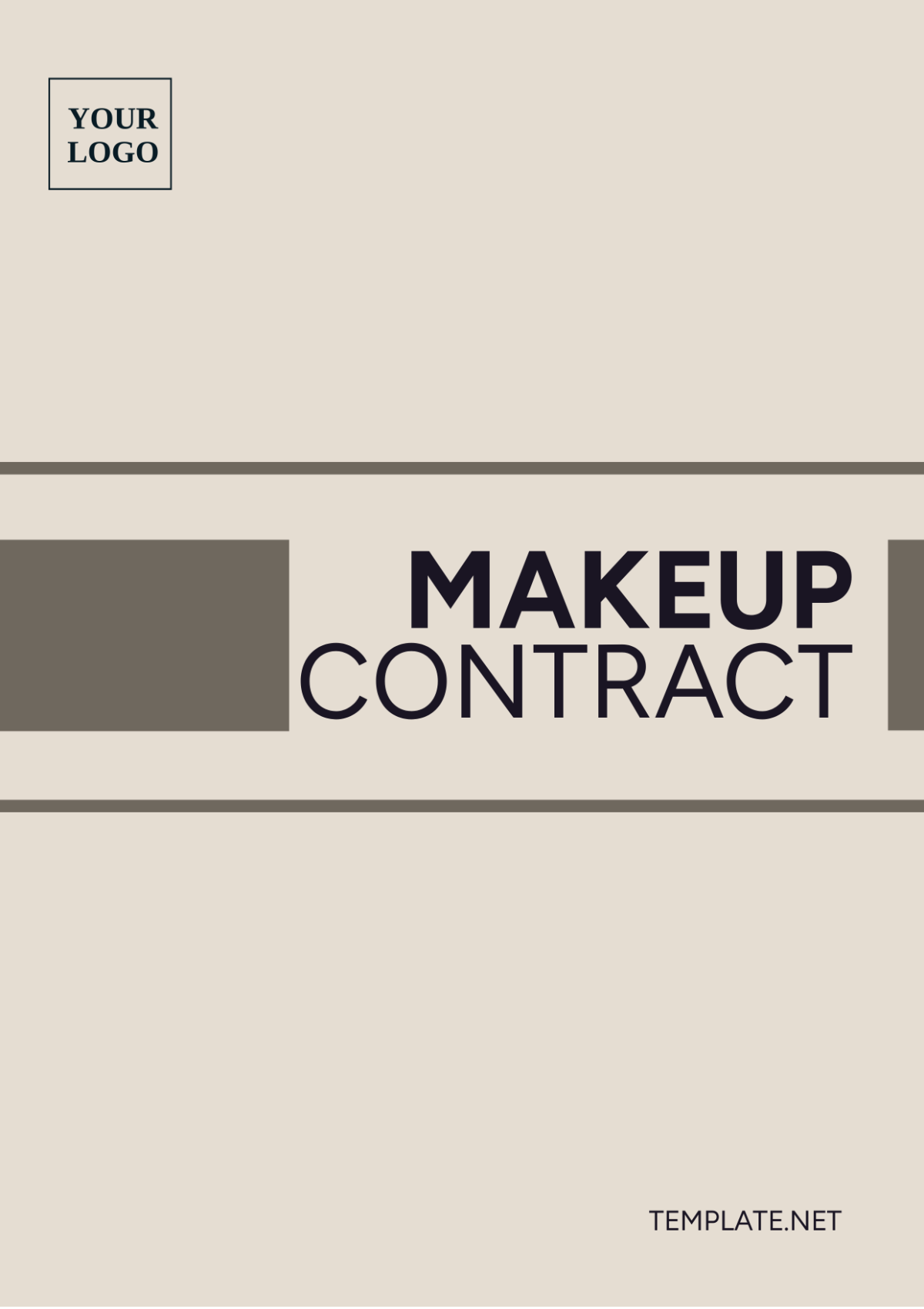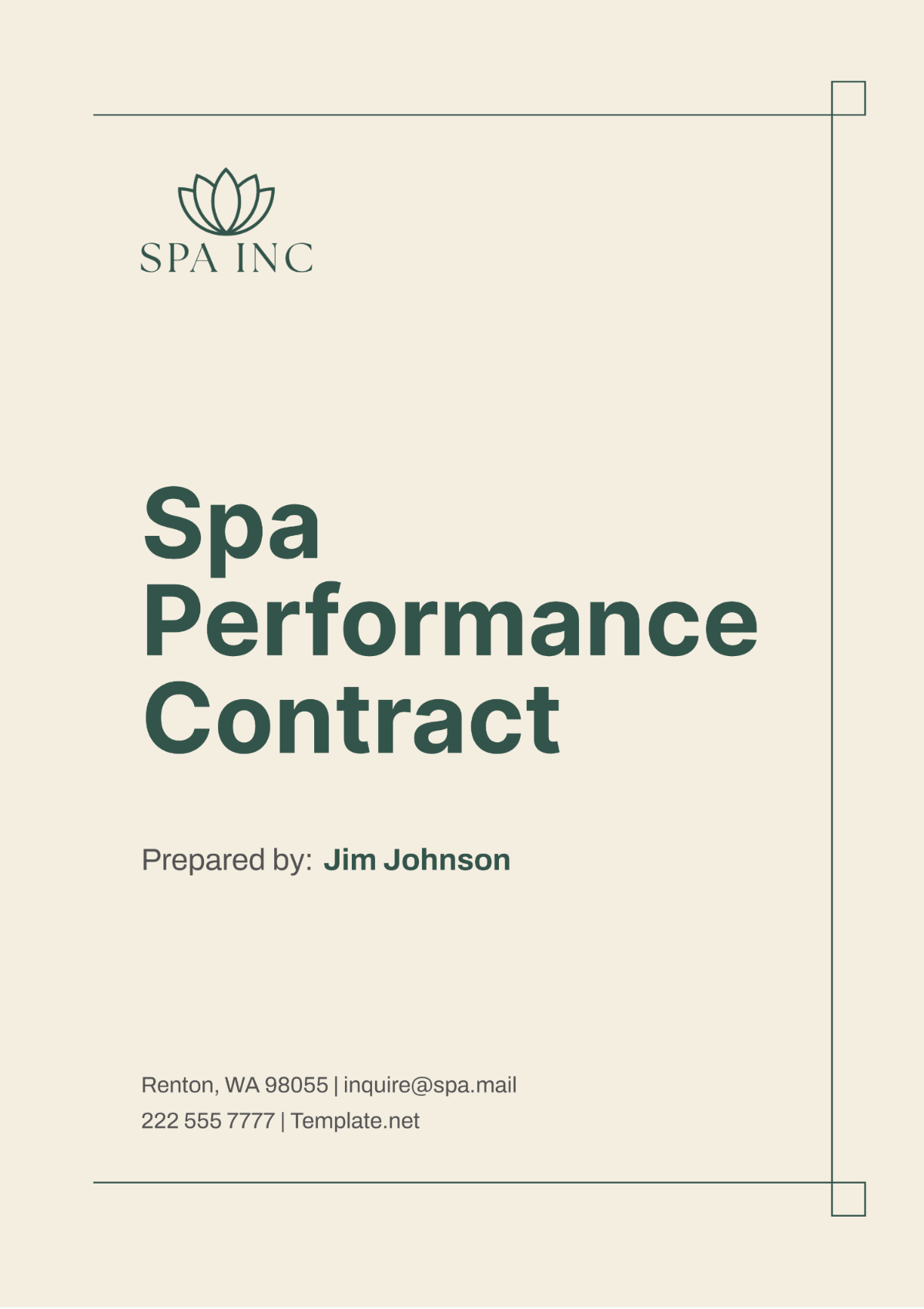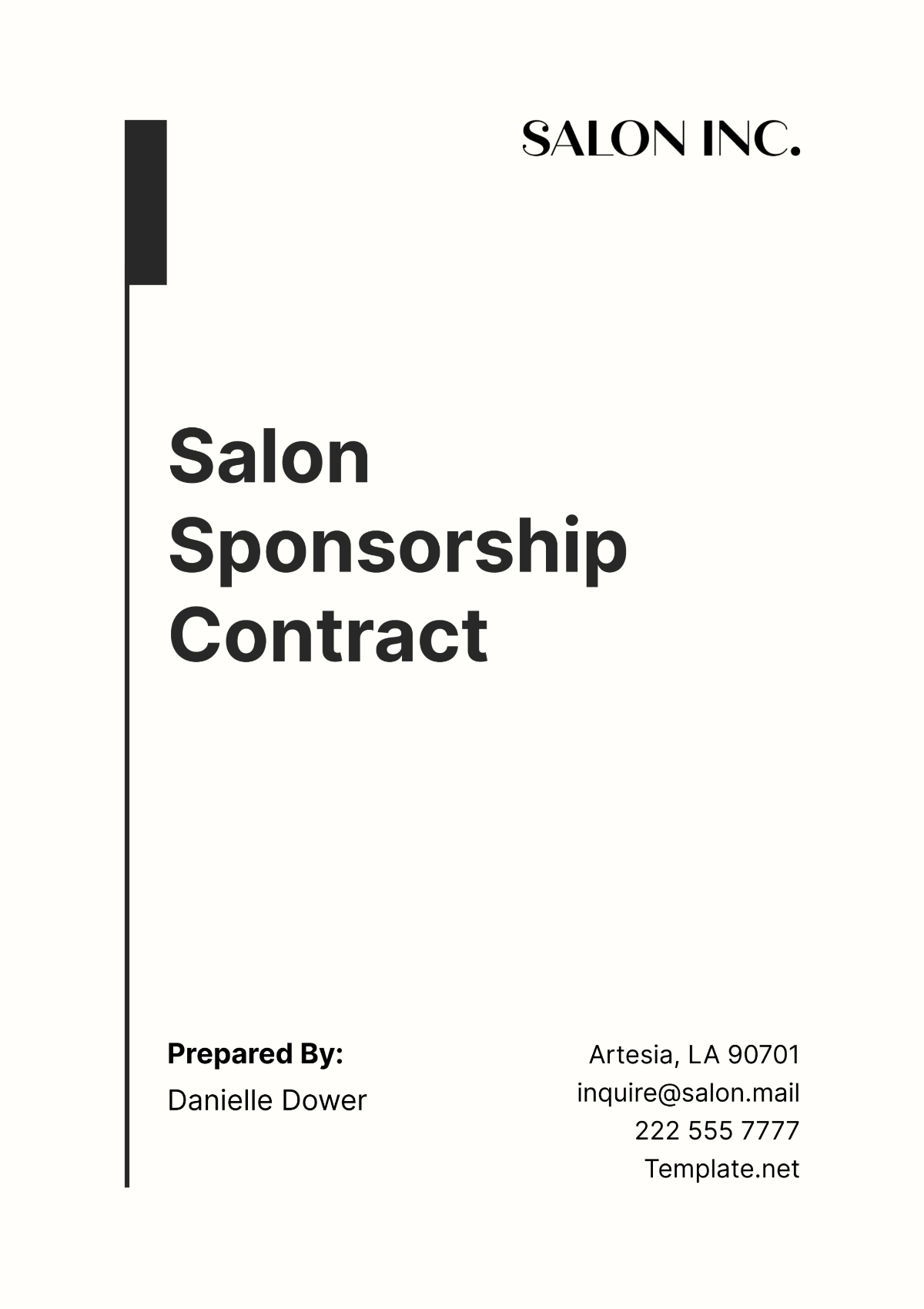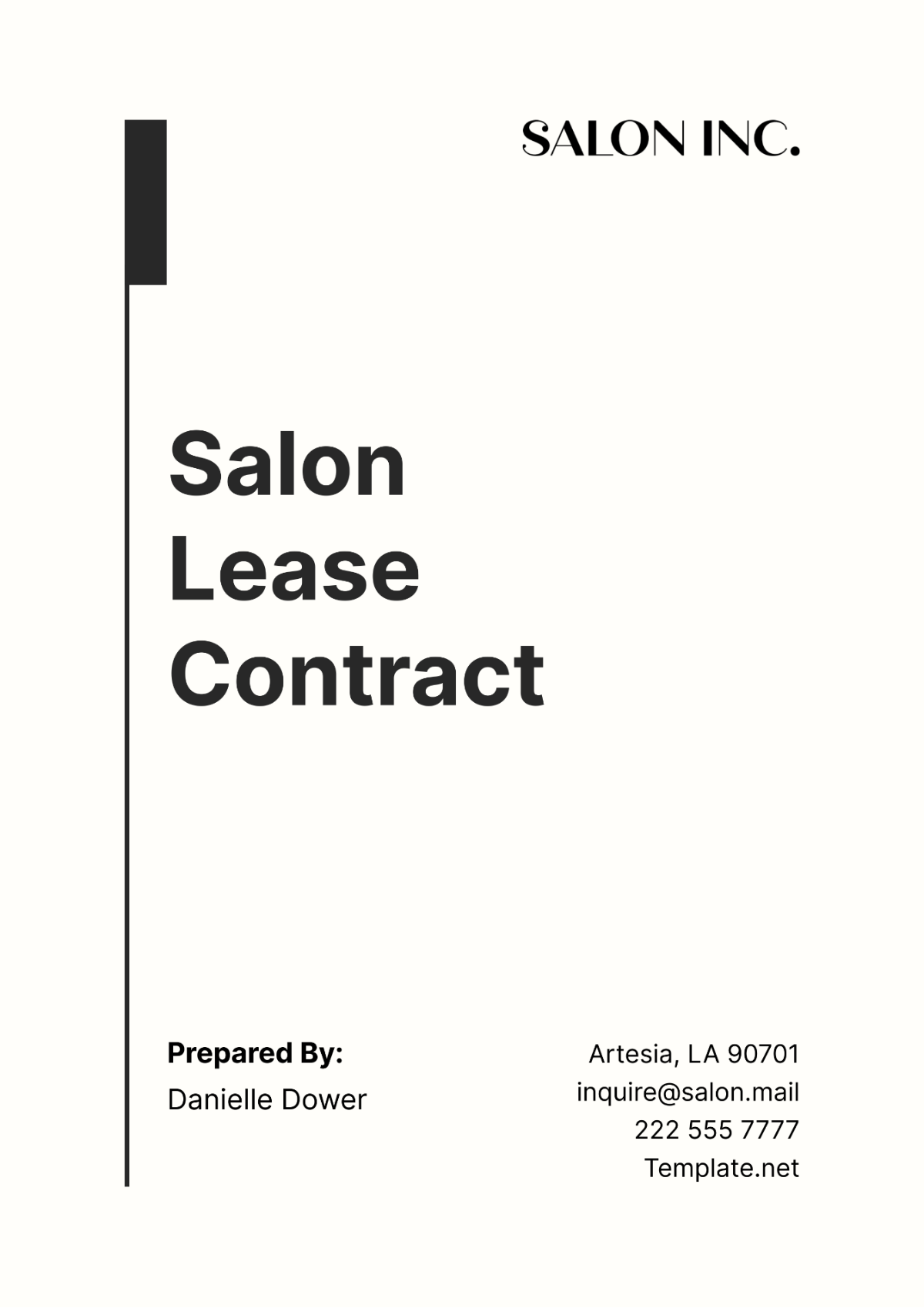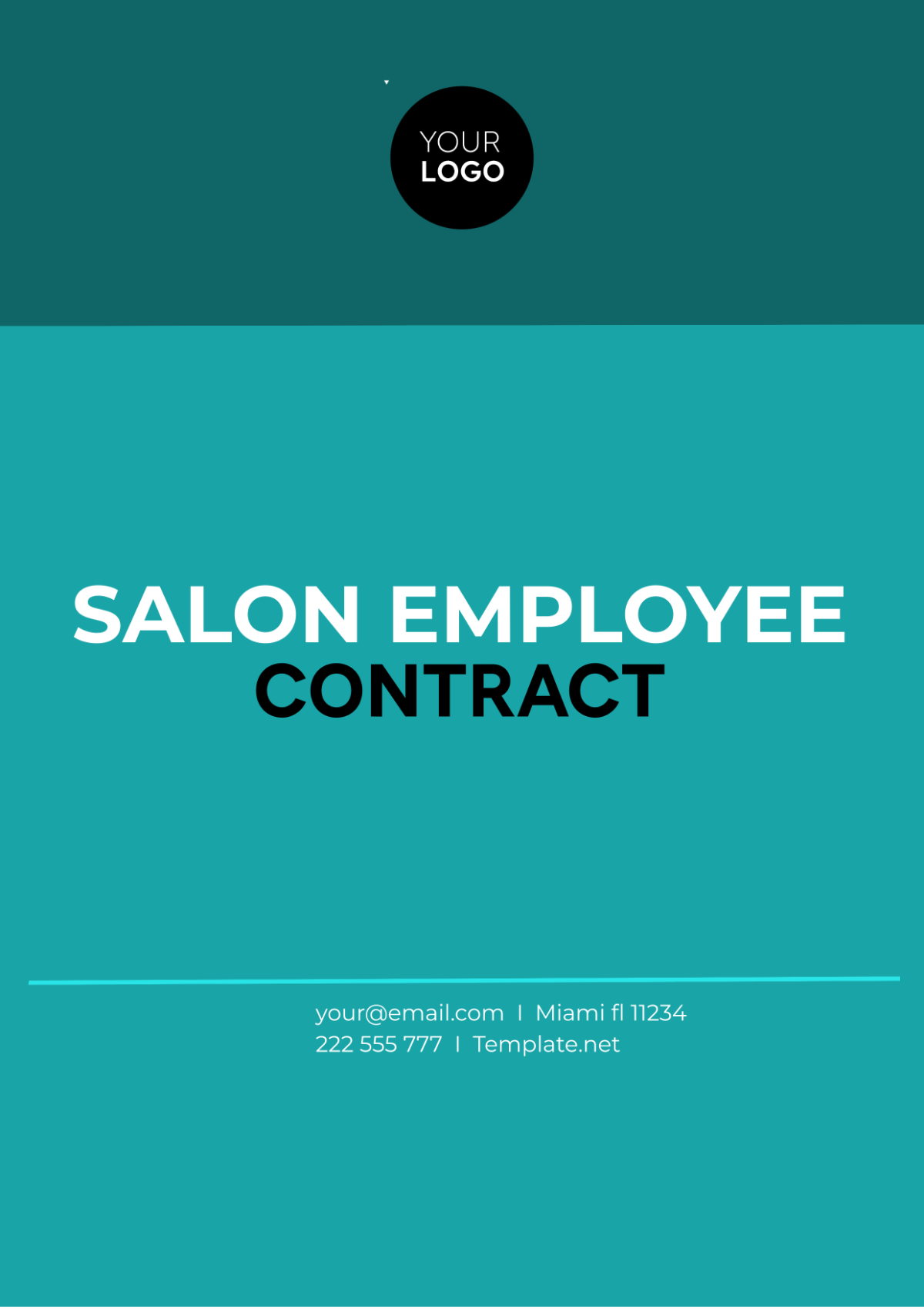Salon Lease Contract
I. The Parties
This Lease Contract ("Contract") is made and entered into on [Month Day, Year] ("Effective Date") by and between [Your Company Name], hereinafter referred to as the ("Lessee") with a primary place of business at [Your Company Address], and [Property Owner's Name], hereinafter referred to as the ("Lessor"), with principal address at [Property Owner's Address] collectively referred to as the ("Parties").
WHEREAS, the Lessor is the lawful owner of the premises located at [Premises Address] ("Premises");
WHEREAS, the Lessee desires to lease the Premises for the purpose of operating a hair and beauty salon;
WHEREAS, the Lessor agrees to lease the Premises to the Lessee and the Lessee agrees to lease the Premises from the Lessor on the terms set forth below;
NOW, THEREFORE, in consideration of the mutual promises, covenants, and conditions herein contained, the parties agree as follows:
II. Grant of Lease
A. Lease Agreement
Lease Grant: The Lessor grants the Lessee the right to lease the Premises for the purpose of operating a hair and beauty salon. This grant is subject to the terms and conditions set forth in this Contract. The Lessor acknowledges that the Lessee’s business operations are lawful and appropriate for the location and zoning of the Premises.
Lease Acceptance: The Lessee accepts the lease of the Premises from the Lessor and agrees to abide by the terms and conditions of this Contract. The Lessee acknowledges that the Premises are suitable for their intended use and that they have had the opportunity to inspect the Premises prior to entering into this Contract.
Lease Term: The term of the lease is [3 years], commencing on the Effective Date. The lease may be terminated earlier in accordance with the termination provisions of this Contract. The Lessee understands that they are committed to leasing the Premises for the full term unless there is a breach of contract or other early termination condition as outlined in the Contract.
B. Premises
Description of Premises: The Premises are located at [Premises Address] and are more particularly described in the attached detailed description of the property. The Premises include any buildings, fixtures, and amenities located on the property.
Condition of Premises: The Lessor represents that the Premises are in good condition and suitable for the operation of a hair and beauty salon. The Lessor has disclosed any known defects or issues with the Premises to the Lessee.
Use of Premises: The Lessee shall use the Premises solely for the operation of a hair and beauty salon and for no other purpose without the prior written consent of the Lessor. The Lessee agrees to comply with all applicable laws and regulations in their use of the Premises.
C. Lease Renewal
Option to Renew: The Lessee may have the option to renew the lease for additional terms, subject to the agreement of the Lessor. The terms and conditions for any renewal periods will be agreed upon by both parties at the time of renewal.
Renewal Terms: The renewal terms, including the rent amount and lease period, will be negotiated between the Lessor and the Lessee. The Lessor will consider factors such as market conditions, the Lessee’s payment history, and the condition of the Premises when determining the renewal terms.
Notice of Renewal: The Lessee must provide the Lessor with written notice of its intention to renew the lease in accordance with the notice provisions of this Contract. This allows the Lessor sufficient time to prepare for the renewal and to negotiate the renewal terms.
III. Rent
A. Rent Amount
Monthly Rent: The monthly rent for the Premises is [$5,000]. This amount is payable in advance on the [1st day] of each month. The Lessee understands that timely payment of rent is a key obligation under this Contract.
First Month’s Rent: The first month’s rent is due on or before the commencement date of the lease term. This ensures that the Lessor receives payment before the Lessee takes possession of the Premises. The Lessee acknowledges that failure to pay the first month’s rent on time may result in the termination of this Contract.
B. Rent Adjustments
Annual Adjustment: The monthly rent may be adjusted annually in accordance with the terms of this Contract. Any such adjustment will be communicated to the Lessee in writing. The adjustment will be based on factors such as changes in market rent, the cost of maintaining the Premises, and the Lessee’s compliance with the terms of this Contract.
Market Review: The Lessor may review the market rent for similar premises in the area to determine whether an adjustment to the monthly rent is warranted. The Lessor will consider factors such as the location, size, and condition of the Premises, as well as the rents charged for similar premises in the area.
Notice of Adjustment: The Lessor will provide the Lessee with at least [30 days’] notice of any adjustment to the monthly rent. This gives the Lessee sufficient time to budget for the increased rent.
C. Security Deposit
Deposit Amount: Upon execution of this Contract, the Lessee will provide the Lessor with a security deposit equal to one month’s rent. This deposit will be held by the Lessor as security for the Lessee’s obligations under this Contract.
Return of Deposit: At the end of the lease term, the Lessor will return the security deposit to the Lessee, less any deductions for unpaid rent, damages beyond normal wear and tear, or any other amount owed by the Lessee under this Contract.
Deposit Receipt: The Lessor will provide the Lessee with a receipt for the security deposit, which will include the amount of the deposit, the date received, and the purpose of the deposit.
IV. Use of Premises
A. Permitted Use
Salon Operations: The Lessee is permitted to use the Premises for the operation of a hair and beauty salon. This includes all activities typically associated with such a business, such as cutting and styling hair, providing beauty treatments, and selling related products. The Lessee agrees to conduct these operations in a professional and ethical manner that enhances the reputation of both the Lessee and the Lessor.
Compliance with Laws: The Lessee must comply with all applicable laws and regulations in the operation of the salon. This includes obtaining any necessary permits or licenses and adhering to health and safety regulations. The Lessee also agrees to comply with any rules and regulations set by the Lessor regarding the use of the Premises.
Respect for Neighbors: The Lessee must operate the salon in a manner that does not cause nuisance or disturbance to neighboring properties. This includes controlling noise levels, managing waste disposal, and maintaining the exterior appearance of the Premises.
B. Prohibited Uses
Other Businesses: The Lessee may not use the Premises for any business other than the operation of a hair and beauty salon without the prior written consent of the Lessor. The Lessor reserves the right to refuse consent if it believes that the proposed use could damage the Premises, disturb neighboring properties, or negatively impact the Lessor’s reputation.
Illegal Activities: The Lessee may not use the Premises for any illegal activities. Any such use will be considered a breach of this Contract and may result in immediate termination of the lease.
Hazardous Materials: The Lessee may not store or use any hazardous materials on the Premises without the prior written consent of the Lessor. The Lessee must comply with all laws and regulations regarding the storage and disposal of hazardous materials.
C. Changes to Use
Request for Change: If the Lessee wishes to change the use of the Premises, it must submit a request to the Lessor in writing. The request should include a detailed description of the proposed new use and any changes that would be required to the Premises.
Lessor’s Consent: The Lessor will review the request and may give its consent at its sole discretion. The Lessor may impose conditions on its consent, such as requiring the Lessee to make certain improvements to the Premises or to comply with additional rules and regulations.
Implementation of Change: If the Lessor gives its consent, the Lessee may proceed with the change in use in accordance with the terms of the consent. The Lessee must comply with all laws and regulations applicable to the new use and must ensure that the change does not disrupt the operation of the salon or cause inconvenience to neighboring properties.
V. Alterations and Improvements
A. Lessee Alterations
Request for Alterations: If the Lessee wishes to make any alterations, additions, or improvements to the Premises, it must submit a request to the Lessor in writing. The request should include detailed plans and specifications for the proposed work, as well as an estimate of the cost and the expected duration of the work.
Lessor’s Consent: The Lessor will review the request and may give its consent at its sole discretion. The Lessor may impose conditions on its consent, such as requiring the Lessee to use certain contractors or materials, or to carry out the work at certain times to minimize disruption to neighboring properties.
Completion of Work: Once the work is completed, the Lessee must provide the Lessor with a copy of all relevant certificates and approvals. The Lessee must also repair any damage caused to the Premises during the course of the work.
B. Ownership of Improvements
Lessor’s Property: All alterations, additions, or improvements made by the Lessee become the property of the Lessor. The Lessee does not have the right to remove these items from the Premises.
End of Lease: At the end of the lease, the Lessee must leave the Premises in the same condition as at the commencement of the lease, fair wear and tear excepted. This includes leaving all alterations, additions, or improvements in place.
Compensation: The Lessee is not entitled to any compensation for alterations, additions, or improvements made to the Premises, unless otherwise agreed in writing by the Lessor.
C. Structural Changes
Structural Alterations: The Lessee is not permitted to make any alterations to the structural elements of the Premises without the Lessor’s express written consent. This includes changes to the walls, ceilings, floors, or other structural components of the Premises.
Request for Structural Alterations: If the Lessee wishes to make structural alterations, it must submit a detailed proposal to the Lessor. The proposal should include architectural plans, a timeline for the work, and a detailed budget.
Lessor’s Consent: The Lessor will review the proposal and may give its consent at its sole discretion. If consent is given, the Lessee must comply with all building codes and regulations and must obtain all necessary permits before commencing work.
VI. Maintenance and Repair
A. Lessee’s Responsibilities
Routine Maintenance: The Lessee is responsible for the routine maintenance of the Premises. This includes tasks such as cleaning, minor repairs, and the replacement of consumables. The Lessee agrees to perform these tasks regularly to maintain a clean and safe environment for its customers and staff.
Major Repairs: If any major repairs are needed, the Lessee will notify the Lessor in writing as soon as possible. The Lessee will be responsible for arranging and paying for these repairs, unless they are due to the Lessor’s negligence or failure to fulfill its obligations under this Contract.
End of Lease: At the end of the lease term, the Lessee will leave the Premises in a clean and tidy condition, with all fixtures and fittings in good working order. Any damage caused by the Lessee or its employees, customers, or visitors must be repaired at the Lessee’s expense.
B. Lessor’s Responsibilities
Structural Repairs: The Lessor is responsible for any repairs to the structural elements of the Premises, including the roof, walls, and foundations. The Lessor will carry out these repairs in a timely manner to ensure the safety and comfort of the Lessee and its customers.
Building Systems: The Lessor is also responsible for maintaining the building systems, including the heating, ventilation, and air conditioning systems, the electrical system, and the plumbing. The Lessor will ensure that these systems are in good working order and comply with all relevant safety standards.
Common Areas: If the Premises are part of a larger building or complex, the Lessor is responsible for maintaining the common areas, such as hallways, elevators, and parking lots. The Lessor will keep these areas clean, safe, and accessible at all times.
C. Inspections
Regular Inspections: The Lessor may conduct regular inspections of the Premises to ensure that the Lessee is complying with its maintenance and repair obligations. These inspections will be conducted at reasonable times and with reasonable notice to the Lessee.
Inspection Reports: After each inspection, the Lessor will provide the Lessee with a written report detailing any maintenance or repair issues that need to be addressed. The Lessee will have a reasonable period of time to address these issues.
Failure to Repair: If the Lessee fails to address the issues identified in the inspection report within the specified time, the Lessor may carry out the necessary repairs and charge the cost to the Lessee.
VII. Insurance
A. Insurance Coverage
General Liability Insurance: The Lessee will maintain a comprehensive general liability insurance policy that covers any claims for bodily injury or property damage arising out of the Lessee’s use of the Premises. The policy will have a limit of not less than [$1,000,000] per occurrence.
Additional Insured: The Lessor will be named as an additional insured on the Lessee’s general liability policy. This means that the Lessor will be covered by the policy in the event of a claim arising out of the Lessee’s use of the Premises.
Proof of Insurance: The Lessee will provide the Lessor with a certificate of insurance as proof of the required coverage. The Lessee will notify the Lessor if the insurance policy is cancelled or significantly changed.
B. Other Insurance
Property Insurance: The Lessee will maintain a property insurance policy that covers any fixtures, fittings, or equipment that the Lessee installs in the Premises. The policy will cover risks such as fire, theft, and water damage.
Workers’ Compensation Insurance: The Lessee will maintain a workers’ compensation insurance policy that covers all of its employees working on the Premises. This policy will comply with the workers’ compensation laws of the state in which the Premises are located.
Business Interruption Insurance: The Lessee may also choose to maintain a business interruption insurance policy. This policy would cover any loss of income resulting from a covered loss, such as a fire or flood, that disrupts the Lessee’s business operations.
C. Insurance Claims
Notification of Claims: If a claim is made against the Lessee’s insurance policy, the Lessee will notify the Lessor in writing as soon as possible. The Lessee will provide the Lessor with all relevant information about the claim and will cooperate with the Lessor in dealing with the claim.
Settlement of Claims: The Lessee will not settle any insurance claim without the Lessor’s prior written consent if the settlement could affect the Lessor’s rights or interests.
Insurance Proceeds: Any insurance proceeds received by the Lessee as a result of a claim will be used to repair or replace the damaged property, unless otherwise agreed in writing by the Lessor.
VIII. Default and Remedies
A. Default by Lessee
Breach of Contract: If the Lessee fails to comply with any of the terms and conditions of this Contract, this will be considered a default. Examples of default include non-payment of rent, unauthorized alterations to the Premises, or failure to maintain the required insurance coverage.
Notice of Default: Upon default by the Lessee, the Lessor will provide the Lessee with a written notice of default. The notice will specify the nature of the default and the steps the Lessee must take to remedy the default.
Opportunity to Remedy: The Lessee will have a reasonable period of time to remedy the default. If the Lessee fails to remedy the default within this time, the Lessor may declare the lease terminated.
B. Remedies
Termination of Lease: If the Lessee fails to remedy the default, the Lessor may terminate the lease. Upon termination, the Lessee must vacate the Premises and remove all of its property. Any property left on the Premises will be considered abandoned and may be disposed of by the Lessor.
Damages: The Lessor may recover from the Lessee all damages it incurs as a result of the Lessee’s default. This includes any unpaid rent, the cost of repairing any damage to the Premises, and any other costs or losses incurred by the Lessor.
Legal Fees: If the Lessor needs to take legal action to enforce the terms of this Contract, the Lessee will be responsible for paying the Lessor’s reasonable attorney’s fees and court costs.
C. Mitigation of Damages
Duty to Mitigate: If the Lessee defaults and the Lessor terminates the lease, the Lessor has a duty to mitigate its damages. This means that the Lessor must make reasonable efforts to re-lease the Premises to a new tenant.
New Lease: If the Lessor is able to re-lease the Premises, the rent received from the new lease will be deducted from the damages owed by the Lessee. However, the Lessee will still be responsible for any difference between the new rent and the rent under this Contract, as well as any costs incurred by the Lessor in re-leasing the Premises.
Efforts to Re-Lease: The Lessor’s efforts to re-lease the Premises may include advertising the Premises, showing the Premises to prospective tenants, and negotiating and executing a new lease.
IX. Notices
A. Notice Requirements
Form of Notice: All notices under this Contract must be in writing. This ensures that there is a clear record of all communications between the parties.
Method of Delivery: Notices must be delivered by registered or certified mail, return receipt requested. This ensures that the notice has been received by the intended recipient and provides a record of delivery.
Address for Notices: Notices should be sent to the address specified in the Contract for each party. If a party changes its address, it must provide the other party with notice of the new address.
B. Receipt of Notices
Acknowledgment of Receipt: Upon receipt of a notice, the party receiving the notice should acknowledge receipt in writing. This acknowledgment should be sent to the party who sent the notice.
Failure to Acknowledge: If the party receiving the notice fails to acknowledge receipt, the party who sent the notice may take further steps to ensure the notice has been received. This could include sending another copy of the notice or using a different method of delivery.
Effect of Notice: A notice is considered effective once it has been received by the intended recipient. The receipt of notice may trigger certain obligations or deadlines under the Contract.
C. Emergency Notices
Urgent Situations: In urgent situations, a party may give notice by telephone or email. However, this should be followed up with a written notice sent by registered or certified mail.
Contact Information: Each party should provide the other party with up-to-date telephone and email contact information for emergency notices. This information should be updated whenever there is a change.
Confirmation of Receipt: Upon receipt of an emergency notice, the party receiving the notice should confirm receipt as soon as possible. This confirmation can be given by telephone or email, but should also be followed up with a written acknowledgment.
X. Miscellaneous
A. Entire Agreement
Contract Supremacy: This Lease constitutes the entire agreement between the Lessee and the Lessor. It supersedes all prior discussions, negotiations, and agreements, whether oral or written.
No Other Representations: Any representations, promises, or conditions not explicitly stated in this Lease shall not be binding on either party. This ensures that both parties are clear about their rights and obligations.
Incorporation of Prior Agreements: Any prior agreements between the parties are incorporated into this Lease to the extent that they are consistent with its terms. If there is any inconsistency, the terms of this Lease will prevail.
B. Amendments
Written Amendments: Any amendments to this Lease must be in writing and signed by both parties. This ensures that any changes to the Lease are properly documented and agreed upon.
No Oral Amendments: Oral amendments to this Lease are not valid. This prevents misunderstandings or disputes about the terms of the Lease.
Agreement to Amendments: Both parties must agree to any amendments to this Lease for them to be valid. This ensures that any changes to the Lease are mutually beneficial.
C. Waiver
No Waiver: The failure of either party to enforce any provision of this Lease shall not be construed as a waiver of that provision. This means that even if a party does not enforce a provision at one time, they can still enforce it later.
Written Waiver: Any waiver of a provision of this Lease must be in writing and signed by the party making the waiver. This ensures that waivers are not made lightly or without due consideration.
Effect of Waiver: A waiver of any provision of this Lease applies only to the specific instance in which the waiver is given and does not affect the enforceability of that provision in other situations.
XI. Signatures
IN WITNESS WHEREOF, the parties have executed this Lease Contract as of the Effective Date.
Lessee

[Authorized Representative Name]
[Your Company Name]
Date: [Month Day, Year]
Lessor

[Property Owner's Name]
Date: [Month Day, Year]

